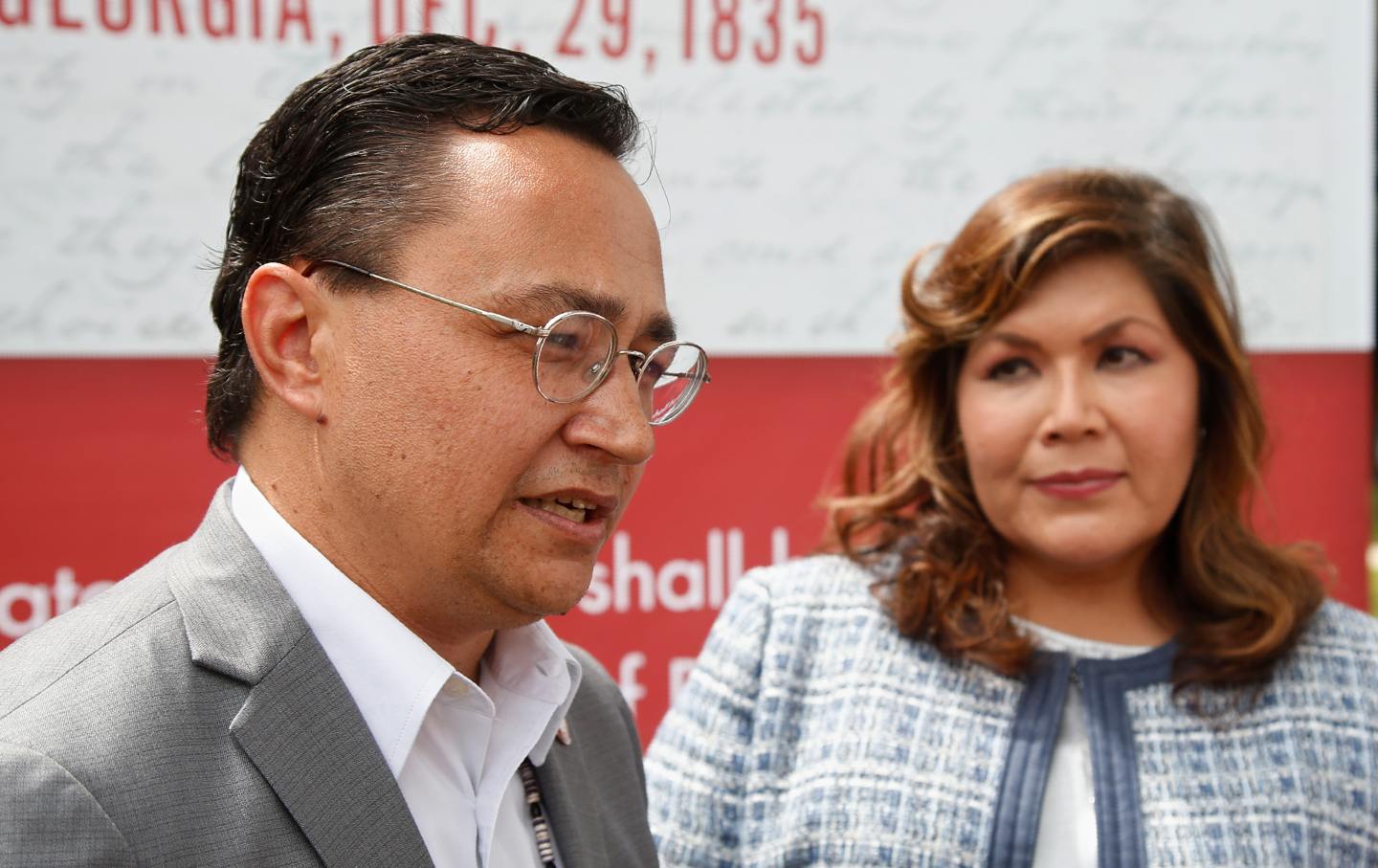One of the Oldest Broken Promises to Indigenous Peoples Is for a Voice in Congress
A treaty commitment to seat a delegate representing the Cherokee Nation in the House has gone unmet for two centuries.

Cherokee Nation Principal Chief Chuck Hoskin Jr., left, announcing that he is nominating Kimberly Teehee, right, as a Cherokee Nation delegate to the US House of Representatives, in Tahlequah, Okla., Thursday, August 22, 2019.
(Sue Ogrocki / AP)Two hundred and thirty-eight years ago, in the immediate aftermath of the American Revolution against the British Empire, representatives of the former colonies that were then governed under the Articles of Confederation and Perpetual Union negotiated a treaty with the Cherokee people. Among the many issues addressed by the Treaty of Hopewell was the question of how Indigenous peoples might make their voices heard in the new systems of government that were only then emerging in the US. The answer came in Article XII, which promised that the Cherokee “shall have the right to send a deputy of their choice, whenever they think fit, to Congress.”
This commitment was reaffirmed and clarified by the US government—now operating under the more formal dictates of the US Constitution—a half-century later in the 1835 Treaty of New Echota. That infamous document was written at a time when the administration of President Andrew Jackson was scheming to implement the forcible removal of the Cherokee people, via the “Trail of Tears,” from their historic lands in states east of the Mississippi River to what is now Oklahoma.
The backstory of the treaty recalls what The New York Times has referred to as “one of the darkest moments in American history and the string of broken promises to Indigenous people across the nation.” As the Times reminds us, “The treaty led the U.S. government to force 16,000 members of the Cherokee Nation on the Trail of Tears, a deadly trek to land in what is now Oklahoma. A quarter of those forced to leave—about 4,000—died before they arrived, as a result of harsh conditions, starvation and disease.”
Yet, buried in the 1835 treaty was a clearly stated “stipulation” that reasserted the right of congressional representation and declared that the Cherokee Nation “shall be entitled to a delegate in the House of Representatives of the United States whenever Congress shall make provision for the same.”
Unfortunately—if perhaps unsurprisingly, knowing the brutal history of the US government’s mistreatment of Indigenous peoples —Congress never enacted the provision. Not during the tenures of Jackson and his many Democratic successors, nor during the tenures of Abraham Lincoln and his many Republican successors.
The promise of congressional representation, like so many other promises made to the first peoples of North America, was broken by the initial 117 Congresses of the United States. And, now, it is being broken by the 118th Congress—even though a delegate designated four years ago by the Cherokee Nation is ready, willing, and able to serve.
Kim Teehee, the aforementioned Delegate-Designee to the US House of Representatives for the Cherokee Nation, declared on Monday, “Congress should honor Native American Heritage Month by finally seating the Cherokee Nation’s Delegate in the U.S. House!”
Teehee, who previously worked as the first deputy director of Native American Outreach for the Democratic National Committee and as a member of President Obama’s White House Domestic Policy Council, served for a number of years as senior adviser to the US House of Representatives Native American Caucus. Now, Teehee says, “Seating the Cherokee Nation’s delegate is not just an issue of representation; it is one of justice, recognition, and reconciliation. Our perspective has been missing from discussions that impact not only our people, but the nation as a whole.”
Her point is well taken. But the prospects for any swift action on representation issues by the current Congress do not look good.
The Democratic-led 117th Congress held a hearing on the Cherokee delegate question exactly a year ago this week. Even though that hearing took place in a lame-duck session ahead of an incoming GOP takeover of the House, it was groundbreaking in that it happened at all. However, the hope for progress was short-lived. In the 118th Congress, the chaotic, sometimes speaker-less and often rudderless, Republican-led House has offered little hope for meaningful action on the issue.
That’s a source of frustration for the Oklahoma-based leadership of the Cherokee Nation, which in recent years has focused with considerable energy on the fight to seat a delegate.
In 2019, the Cherokee Council approved Principal Chief Chuck Hoskin Jr.’s designation of Teehee to serve as the first-ever congressional delegate representing the Cherokee Nation—which, with more than 450,000 enrolled members, is the largest tribe in the United States. Since then, tribal leaders have made the case that “the commitment made in the Treaty of New Echota remains as binding for the United States and Cherokee Nation today as it was in 1835.”
“Federal courts have held that the Cherokee Nation entered into and is bound today by treaties signed with the United States. Congress is clear on this, too. In 2002, through Public Law 107-331, Congress said that the Cherokee Nation ‘has maintained a continuous government-to-government relationship with the United States since the earliest years of the Union,” explains the Cherokee Delegate campaign, which has attracted the support of thousands of people across the country. “The path forward is clear: Congress needs to vote to seat the delegate that’s been denied to Cherokee Nation for 187 years.”
Popular
“swipe left below to view more authors”Swipe →The movement has attracted sympathy from key members of Congress.
“I think there’s a strong case here,” said US Representative James McGovern (D-Mass.), who chaired the House Rules Committee hearing that considered the delegate issue back in 2022. “As I study this issue, I believe it’s the right thing to do—it’s the moral thing to do.”
During that hearing, McGovern and several other members of the committee asked pointed questions about how to make an arrangement that would honor the treaty commitment. In so doing, they explored a wide range of issues that have arisen with regard to the choosing of the promised delegate—via appointment or election —and concerns about how the delegate might participate in congressional committee deliberations, if not in votes on final passage of legislation. (The District of Columbia, Guam, the Northern Mariana Islands, and the Virgin Islands elect delegates who cannot vote on the House floor but can serve on committees, while Puerto Rico elects a resident commissioner.)
McGovern noted that other tribes have contacted members of Congress with claims regarding treaty-defined rights to representation, including the Choctaw Nation, which points to a reference in the 1830 Treaty of Dancing Rabbit Creek to the prospect that the tribe “might have the privilege of a Delegate on the floor of the House of Representatives.” That treaty says “that Congress may consider of and decide the application” of that delegate proposal.
McGovern also discussed outreach from smaller Cherokee bands which argue that they, too, have a treaty right to name a delegate. One of them, Oklahoma’s United Keetoowah Band of Cherokee Indians, nominated Oklahoma attorney Victoria Holland to serve as its delegate. Another, the Eastern Band of Cherokee Indians in North Carolina, has yet to make a designation. The United Keetoowah Band of Cherokee Indians argues, “All three present-day tribes of the Cherokee people share the same treaty and have equal right to a Congressional delegate.”
Representation debates can be complex and often feature disputes over how representatives are chosen and who will be seated. And, of course, over the broader question of whether anyone in the United States should be without full voting representation in the House and the Senate— an issue raised often in recent years by the D.C. Statehood movement.
Teehee and other advocates for congressional recognition of a Cherokee Delegate are the first to acknowledge that what they propose is just one step in addressing historic injustices, many of which date to the time of the Treaty of New Echota and the forced relocation associated with the Trail of Tears. “I feel it now just talking about it—you know, how proud I am to represent my nation,” she has said. “But then I can’t help but think about what we lost in the process, too.”
Congressional action to provide at least some measure of the representation that was promised in the Treaty of New Echota would not begin to restore all that has been lost by the Cherokee people. But, as Teehee explains: “The final outcome being the seating of the actual delegate in the House would give some small measure of justice for those, including my own ancestors, who lost their lives during that forced march.”
Time is running out to have your gift matched
In this time of unrelenting, often unprecedented cruelty and lawlessness, I’m grateful for Nation readers like you.
So many of you have taken to the streets, organized in your neighborhood and with your union, and showed up at the ballot box to vote for progressive candidates. You’re proving that it is possible—to paraphrase the legendary Patti Smith—to redeem the work of the fools running our government.
And as we head into 2026, I promise that The Nation will fight like never before for justice, humanity, and dignity in these United States.
At a time when most news organizations are either cutting budgets or cozying up to Trump by bringing in right-wing propagandists, The Nation’s writers, editors, copy editors, fact-checkers, and illustrators confront head-on the administration’s deadly abuses of power, blatant corruption, and deconstruction of both government and civil society.
We couldn’t do this crucial work without you.
Through the end of the year, a generous donor is matching all donations to The Nation’s independent journalism up to $75,000. But the end of the year is now only days away.
Time is running out to have your gift doubled. Don’t wait—donate now to ensure that our newsroom has the full $150,000 to start the new year.
Another world really is possible. Together, we can and will win it!
Love and Solidarity,
John Nichols
Executive Editor, The Nation
More from The Nation

Christmas Wish Christmas Wish
The toll is staggering: In 2024, gun violence in the US resulted in 40,886 deaths and 31,652 injuries.

Islamophobic Elites Lied to Destroy the Life of a Palestinian Brown Student Islamophobic Elites Lied to Destroy the Life of a Palestinian Brown Student
Plutocrats, pundits, and government officials joined together in a racist smear campaign against a queer Palestinian student at Brown University.

Recent Democratic Victories Have Republicans Running Scared Recent Democratic Victories Have Republicans Running Scared
Elise Stefanik is just the latest top Republican deciding against running in the 2026 midterms.

Pirate Trump Pirate Trump
Donald Trump escalates Caribbean tensions with vessel attacks near Venezuela.




